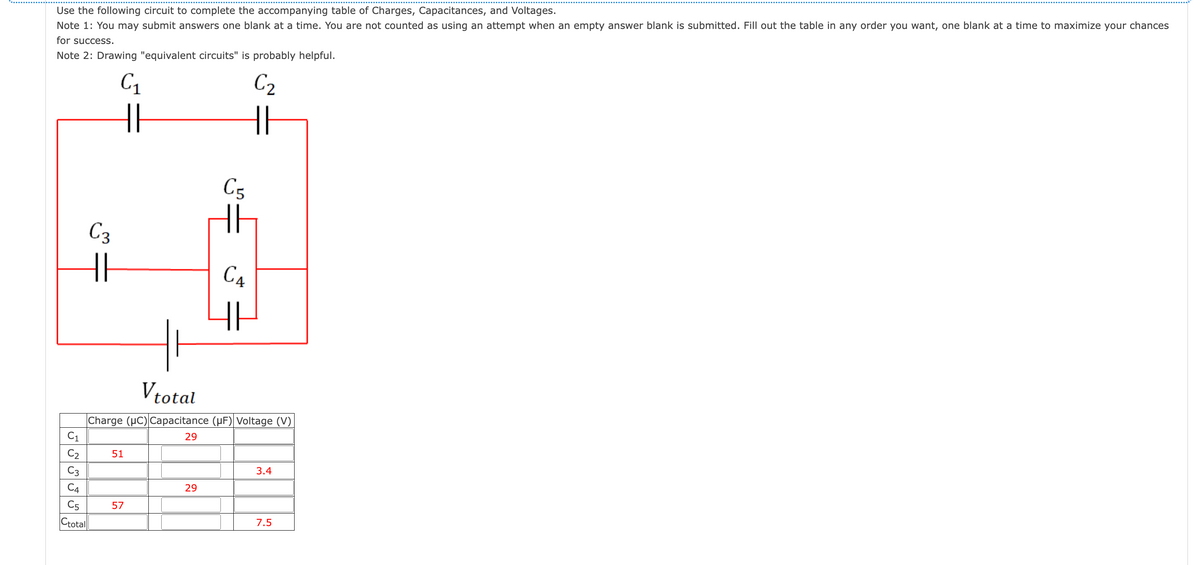Use the following circuit to complete the accompanying table of Charges, Capacitances, and Voltages. Note 1: You may submit answers one blank at a time. You are not counted as using an attempt when an empty answer blank is submitted. Fill out the table in any order you want, one blank at a time to maximize your chances for success. Note 2: Drawing "equivalent circuits" is probably helpful. C₁ C₁ C3 C4 Cs Ctotal S = 51 57 C5 Vtotal Charge (UC) Capacitance (UF) Voltage (V) 29 29 C4 HE 3.4 7.5
Use the following circuit to complete the accompanying table of Charges, Capacitances, and Voltages. Note 1: You may submit answers one blank at a time. You are not counted as using an attempt when an empty answer blank is submitted. Fill out the table in any order you want, one blank at a time to maximize your chances for success. Note 2: Drawing "equivalent circuits" is probably helpful. C₁ C₁ C3 C4 Cs Ctotal S = 51 57 C5 Vtotal Charge (UC) Capacitance (UF) Voltage (V) 29 29 C4 HE 3.4 7.5
Principles of Physics: A Calculus-Based Text
5th Edition
ISBN:9781133104261
Author:Raymond A. Serway, John W. Jewett
Publisher:Raymond A. Serway, John W. Jewett
Chapter20: Electric Potential And Capacitance
Section: Chapter Questions
Problem 18OQ
Related questions
Question

Transcribed Image Text:Use the following circuit to complete the accompanying table of Charges, Capacitances, and Voltages.
Note 1: You may submit answers one blank at a time. You are not counted as using an attempt when an empty answer blank is submitted. Fill out the table in any order you want, one blank at a time to maximize your chances
for success.
Note 2: Drawing "equivalent circuits" is probably helpful.
C₂
C3
HE
C₁
C₂
C3
C4
C5
Ctotal
C₁
HI
51
Vtotal
Charge (μC) Capacitance (μF) Voltage (V)
29
57
C5
HH
29
CA
3.4
7.5
Expert Solution
Step 1
Step by step
Solved in 4 steps

Knowledge Booster
Learn more about
Need a deep-dive on the concept behind this application? Look no further. Learn more about this topic, physics and related others by exploring similar questions and additional content below.Recommended textbooks for you

Principles of Physics: A Calculus-Based Text
Physics
ISBN:
9781133104261
Author:
Raymond A. Serway, John W. Jewett
Publisher:
Cengage Learning

Physics for Scientists and Engineers, Technology …
Physics
ISBN:
9781305116399
Author:
Raymond A. Serway, John W. Jewett
Publisher:
Cengage Learning

Physics for Scientists and Engineers
Physics
ISBN:
9781337553278
Author:
Raymond A. Serway, John W. Jewett
Publisher:
Cengage Learning

Principles of Physics: A Calculus-Based Text
Physics
ISBN:
9781133104261
Author:
Raymond A. Serway, John W. Jewett
Publisher:
Cengage Learning

Physics for Scientists and Engineers, Technology …
Physics
ISBN:
9781305116399
Author:
Raymond A. Serway, John W. Jewett
Publisher:
Cengage Learning

Physics for Scientists and Engineers
Physics
ISBN:
9781337553278
Author:
Raymond A. Serway, John W. Jewett
Publisher:
Cengage Learning

Physics for Scientists and Engineers with Modern …
Physics
ISBN:
9781337553292
Author:
Raymond A. Serway, John W. Jewett
Publisher:
Cengage Learning

College Physics
Physics
ISBN:
9781285737027
Author:
Raymond A. Serway, Chris Vuille
Publisher:
Cengage Learning

College Physics
Physics
ISBN:
9781305952300
Author:
Raymond A. Serway, Chris Vuille
Publisher:
Cengage Learning